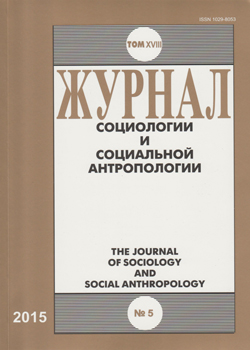The Rights of Working Mothers and Social Support of the Young Family in Russia
Keywords:
young family, family resources, measures of social support, discrimination of working mothers, stigmatization of pregnant women, protection of social and labor
Abstract
The article addresses the situation of the young Russian family from the point of view of its need for external support and the pursuit of prosperity and economic independence based on the realization of its labor potential. The problem approach, traditionally used in studies of the young family, focuses on difficulties and deficiencies, thus contributing to creation of an image of the young family as one falling under the category of weak and vulnerable social groups and requiring social assistance and support by default. The authors emphasize the importance of the resource approach, which allows extending the perception of the young family as an active social subject, unwilling to shift the responsibility for its well-being onto the state. Statistics and sociological research data is used in order to characterize problems, resources and measures of social support of the young family. The author’s empirical study focuses on the labor sphere, especially important for the well-being of the young family. The objective of the study was to analyze violations of social and labor rights of mothers, including pregnant women, as well as practices of their social protection. The research was conducted between 2009 and 2011 employing the case study method. The research was based on the target sample of two groups of mothers: “happy” and “socially vulnerable” ones selected by the following criteria: marital status, self-identification of the economical situation, a permanent job before pregnancy, the quality of family and friends’ support. The discursive analysis of group and individual interviews with women and employees of non-government organizations was conducted (72 and 18 people respectively). All of the young mothers confronted a situation of non-payment maternity allowances and child benefits. The study has shown that owners of small businesses and individual entrepreneurs violate the labor legislation most frequently. Legal ignorance and a shift of responsibility onto the employer and the state typical of a part of the women increase the probability of labor discrimination. Apart from economic and legal factors, the interviews have revealed manifestations of stigmatization of pregnant female employees. While applying for assistance to executive and supervisory authorities, women are faced with barriers preconditioned by a formal attitude of officials, as well as discrepancies of legal regulation of relationships between business and the state. Perfection of the practice of common responsibility of the state and the business society as well as improving legal literacy and citizens’ ability to defend their rights themselves (individually or with the help of non-government organizations), development of the civil society are the necessary mechanisms, which will contribute to forming a new “moral order” with regards to support of mothers. The results of this study testify to a need for reconfiguration of the system of social support for the young family in Russia and an increase in responsibility of all interacting actors: the state, the family and the employer. rights, institutions of civil society
Published
2015-09-20
How to Cite
Bezrukova, O., & Samoylova, V. (2015). The Rights of Working Mothers and Social Support of the Young Family in Russia . ZHURNAL SOTSIOLOGII I SOTSIALNOY ANTROPOLOGII (The Journal of Sociology and Social Anthropology), 18(5), 27–44. Retrieved from http://jourssa.ru/jourssa/article/view/428
Section
Challenging Everyday Life of Families

